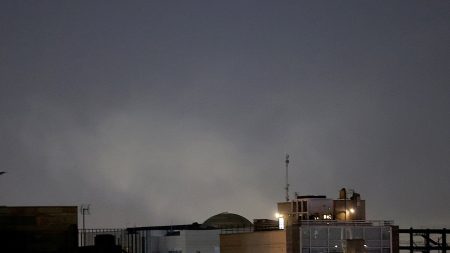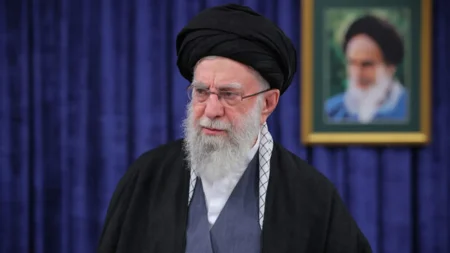Ukrainian Commander Appeals for Tomahawk Missiles Amid Ongoing Conflict with Russia
On the eastern frontline in Ukraine, where intense fighting continues between Russian and Ukrainian forces, a senior Ukrainian commander has made a direct appeal to the Trump administration for more robust military support. Major Oleh Shyriaiev, who commands the 225th Battalion in northern Ukraine, has specifically requested long-range Tomahawk missiles to help his troops hold the line against Russian advances. Speaking from the northeastern Sumy region, Major Shyriaiev emphasized the historical significance of the current conflict, describing it as “the biggest war in the world since World War II.” For Ukraine, this fight represents more than just territorial defense—it’s the culmination of a three-century struggle for complete independence from Moscow’s influence. The country has been striving to break free from Russia’s sphere of influence since gaining independence from the Soviet Union in 1991, and Major Shyriaiev believes this war represents Ukraine’s chance to finally achieve that goal.
The request for Tomahawk missiles isn’t merely about military advantage; it’s about gaining leverage for potential peace negotiations. These U.S. long-range missiles, with their range of approximately 1,550 miles, could significantly enhance Ukraine’s ability to impose greater costs on Moscow and potentially undermine Russian offensive operations. John Hardie, deputy director of the Foundation for the Defense of Democracies Russia Program, notes that bolstering Kyiv’s long-range strike capabilities would provide “Ukraine and the United States greater leverage to achieve peace.” This capability would be transformative for Ukraine, which lacks a navy and would need ground-based launchers for these subsonic cruise missiles that are typically launched from U.S. Navy ships and submarines. The missiles are specifically designed to penetrate deep into enemy territory—a capability that could dramatically shift the power dynamics of the conflict.
The Trump administration’s position on providing such powerful offensive weapons has been inconsistent. President Trump initially suggested in October, during Ukrainian President Volodymyr Zelenskyy’s White House visit, that he might send Tomahawks, stating, “If this war doesn’t get settled, I may send Tomahawks.” However, by early November, he pulled back from this position, telling reporters aboard Air Force One that the U.S. would not be sending Ukraine Tomahawk missiles “for now.” This wavering stance reflects broader concerns that providing such offensive weapons could be viewed as an escalatory move by Russian President Vladimir Putin, who reportedly warned Trump against sending such weapons during a recent phone call. The Biden administration had similarly avoided providing certain offensive capabilities out of fear of escalation with Russia.
Despite the uncertainty surrounding U.S. military aid, Major Shyriaiev remains confident in Ukraine’s determination and ability to defend itself. “I am confident that our armed forces will continue to defend Ukraine’s sovereignty regardless of the type and number of weapons we receive,” he stated. While acknowledging that Ukraine would “greatly benefit from the distribution of Tomahawk missiles” due to their “proven precision capability,” the commander recognizes the complex political considerations at play. His resolve reflects the broader Ukrainian military’s commitment to defending their nation “with all the tools at our disposal,” even as they face significant challenges on the battlefield.
Major Shyriaiev’s battalion is strategically positioned in Sumy, an oblast bordering Russia that has been central to Ukrainian counteroffensives this fall. While Russia continues to make steady if slow progress elsewhere on the battlefield, Ukraine has managed to stall Russian advances in this region. Reclaiming territory in Sumy could significantly strengthen Ukraine’s position in future peace negotiations—a key priority for President Trump. However, the challenges are substantial as Major Shyriaiev describes Russia’s battlefield tactics as “meat assaults,” where Russian forces use their substantial manpower advantage to overwhelm Ukraine’s smaller forces. This approach, which the major likens to “throwing Russian soldiers into a meat grinder,” is achieving limited successes despite the high human cost.
Looking at specific battlefields, such as the contested city of Pokrovsk, Major Shyriaiev offers a clear-eyed assessment of the situation. Even if Russia eventually captures the city, he emphasizes that “every larger town or smaller city will be a serious battle to take, and the Russians will be losing a large number of manpower.” He predicts that in places like Pokrovsk, Russian forces will “lose a lot of troops and their combat capability will suffer seriously.” This war of attrition highlights the devastating human cost of the conflict and underscores why Ukrainian commanders like Shyriaiev are appealing for advanced weapons that could help break the current stalemate. As Ukraine continues to defend its sovereignty against a larger adversary, the decisions made by the incoming Trump administration regarding military support could prove decisive in shaping both the battlefield dynamics and the eventual path to peace negotiations.














